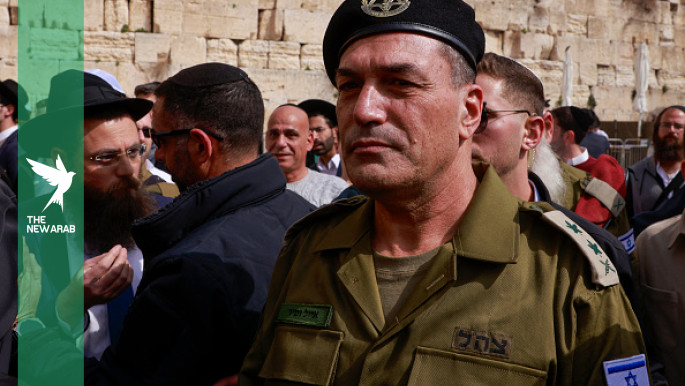Eyal Zamir was appointed as Israel’s military chief of staff in March of this year [Getty/file photo]
The Israeli army has laid out a plan to intensify its attacks in the region, saying this was a part of “challenging security concerns,” amid the ongoing war in the Gaza Strip and Israeli military aggression in Lebanon, Syria and other countries.
In a special session held on Monday, Eyal Zamir, the army’s chief of staff, said the Israeli military must be “prepared for a continued wide-scale and comprehensive campaign, while managing a complex and challenging reality that requires multi-arena operations,” Israeli media reported on Tuesday.
Zamir instructed the army to “operate offensively” across multiple arenas alongside defence sectors and the country’s borders in a bid to “achieve its defensive needs,” indicating the army’s desire to escalate its attacks in the Middle East.
“We will continue preserving air superiority and advancing the intelligence effort,” he said during the session.
The army chief said that 2026 “will be a year of readiness, consolidation of achievements, return to competence and fundamentals and utilising operational opportunities,” as he described the war in Gaza as the “most complex” the Israeli army “has ever known”.
Over 59,000 Palestinians have now been killed in Gaza since 7 October 2023, according to health ministry figures. The true death toll is believed to be much higher.
The coastal enclave is witnessing a hunger crisis as a consequence of a brutal Israeli siege, with at least 33 Palestinians dying over the past 48 hours due to starvation and malnutrition.
“Weakening” Syria and Lebanon’s Hezbollah
The military chief, appointed in March this year, said more buffer zones along Israel’s borders in the region must be established, in what appeared to be a threat to Syria and Lebanon in particular.
Israel has occupied five points inside Lebanon ever since a war with Hezbollah ended there in November 2024, refusing to withdraw despite a ceasefire agreement, and has launched incursions into and captured more territory in Syria since the fall of the Assad regime in December 2024.
It has occupied Syria’s Golan Heights since 1967.
Zamir also vowed that the military will continue to “weaken” Syria and Lebanon’s Iran-backed Hezbollah.
Israeli forces have carried out aerial campaigns against Syrian government forces in the country’s south, and have struck several government interests over the past week under the pretext of “protecting” the Druze community, following sectarian clashes in Suweida involving Bedouin and Druze residents.
He said he would instruct the Israeli army to continue its military operations in the West Bank, where more than 900 Palestinians have been killed in raids since the start of the war on Gaza.
Additionally, he said the war against Iran “isn’t over” and that Tehran and its axis will “remain in their sights”.
Israel and Iran were engaged in a 12-day war in June this year, where an estimated 1,209 Iranians were killed. Israel targeted top Iranian military chiefs and scientists in its campaign, as well as nuclear interests.
Tehran and Tel Aviv had previously struck each other sporadically amid the fallout of the Gaza war.
US-Israeli rift?
Israel has faced growing global outrage for its daily killing of civilians and starvation of Gaza.
In a notable development, Tom Barrack, the US envoy to Syria, denounced Israel’s recent strikes in the country, in what can be interpreted as a slight shift in tone to Washington’s reactions to Israel’s conduct in the region.
He called the attacks “poorly timed,” adding that they complicated efforts to stabilise the region.
On the other hand, Barrack expressed support for the Syrian government’s handling of the deadly fighting in Suweida.
He said Ahmed al-Sharaa’s administration “conducted themselves as best they can as a nascent government with very few resources to address the multiplicity of issues that arise in trying to bring a diverse society together”.


